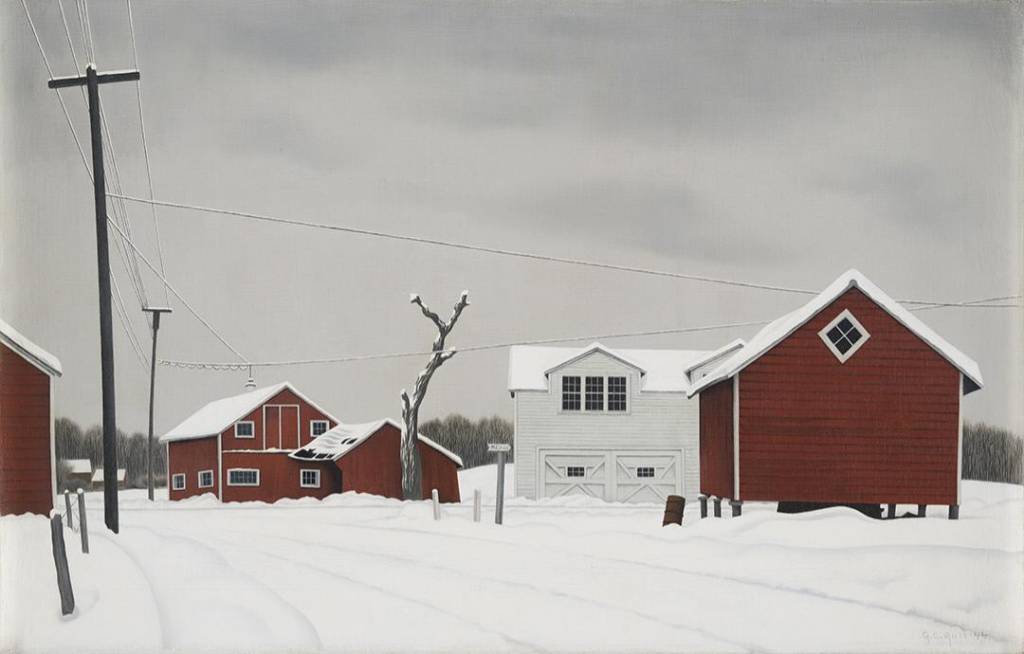
George Copeland Ault (1891 – 1948)
Daylight at Russell’s Corners, 1944
Crystal Bridges Museum of American Art, Bentonville, Arkansas
Autumn is upon us and soon, perhaps, rural areas of our region may look similar to George Copeland Ault’s 1944 painting Daylight at Russell’s Corners. In celebration of the artist’s 126th birthday, I want to explore, through his biography and his work, the area he called home for the last several years of his life, a community called Russell’s Corners, located just outside Woodstock, New York.

George Ault in France, ca. 1910
George Ault moved to Woodstock in 1937 and lived there until his untimely death by drowning at the age of 57. Ault had endured many hardships in his life, including the loss of his family’s fortune in the 1929 stock market crash. His mother died in a mental hospital, and the shock of Black Tuesday led to the suicides of his three brothers shortly afterward. These traumas in his personal life may have largely affected his increasingly strange and erratic behavior in the 1930s, combined with severe alcoholism, which eventually alienated most of his artist and dealer friends.
His retreat to Woodstock with his wife Louise signaled a fresh start in his life. Here, he and Louise enjoyed quiet walks throughout the countryside where, at a small intersection just outside town called Russell’s Corners, Ault found a subject that enthralled him for the rest of his life.

George Copeland Ault (1891-1948)
Black Night: Russell’s Corners, 1943
Oil on canvas
Pennyslvania Academy of the Fine Arts Museum
George Ault painted five pictures of Russell’s Corners during differing times of the day and year. The work featured in the Crystal Bridges collection is the sole piece depicting the scene during the daytime, the landscape beautifully covered in snow. He also captured the small collection of buildings from various angles, each one rendered in the style associated with Precisionist artists like Charles Sheeler and Ralston Crawford. After his death, his wife Louise said that this lonely intersection held some “mystical power” for the artist, and that painting these scenes, and Ault’s art in general, served as a way for him to make “order out of chaos.”

George Copeland Ault (1891-1948)
Bright Light at Russell’s Corners, 1946
Smithsonian American Art Museum
Ault’s death in 1948 was ruled a suicide by the coroner, and one can sense that the artist may have struggled with mental health issues that, for him in that time, felt beyond his control. His wonderfully controlled and detailed canvases of Russell’s Corners, however, will continue to enthrall viewers with its mystery, melancholy, and mystical quality.

George Copeland Ault (1891-1948)
August Night at Russell’s Corners, 1940
Joslyn Art Museum, Omaha, Nebraska
After his death, Louise described her husband through a quote by German philosopher Frederich Nietzsche: “Unless there be chaos within, no dancing star can be born.”

George Copeland Ault (1891-1948)
January Full Moon, 1941
Nelson Atkins Museum of Art, Kansas City, Missouri
Editor’s Note: Some of the structures Ault painted at Russell’s Corners are still standing. You can find them at the corner of Lower Byrdcliffe Road and Rock City Road in Woodstock, New York, using Google Maps’ street view. –LD

Russell’s Corners today:
the junction of Lower Byrdcliffe Road and Rock City Road, Woodstock, New York,



